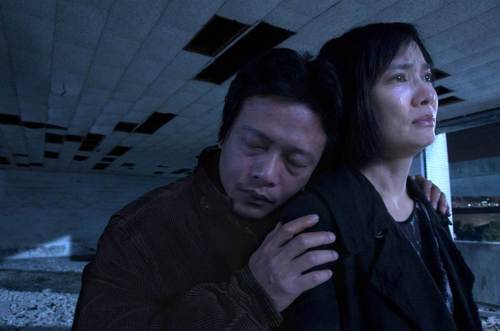Ming-liang Tsai’s Stray Dogs, winner of this year’s Grand Jury Price, is not for everyone. In fact, it is not for most people. After the opening scene, a continuous shot of a woman brushing her hair while sitting next to two sleeping children which lasts for seven minutes, you know exactly where you are: cinema in its barest and purest form; almost closer to an art installation than a narrative film. The plot (it’s not as much a plot as very loose narrative linking the different images) depicts a father (Tsai regular Lee Kang-sheng) and his two children who live in Taipei. During the day, the father works as a human billboard, holding a sign next to a busy road while the children roam the streets of the city. There is little more to say about the story. Not much happens and we don’t learn much about the characters. Furthermore, the pace of the film is excruciatingly slow. There is little to no camera movement and the different scenes are extremely long (the entire 138 minute film contains about as many shots as a single scene in a Paul Greengrass film).
It would be very easy to dismiss Stray Dogs as pretentious and boring or to lose patience with it (as indubitably many will). You keep waiting for something to happen, and it never does. Scenes have no causes or consequences, they just exist. We see the man eat a chicken, stand beside the road holding his billboard, we see the children wandering a supermarket getting free samples, we see a woman feeding stray dogs. This breaks every rule of fiction cinema and nothing seems to make any sense. If you go along with it however, Stray Dogs is anything but boring. It definitely is long, but it’s also mesmerizing and beautiful. It has a certain hypnotic quality to it: you don’t know what you are watching or why you are watching it, but the images are somehow fascinating. They burn themselves into the brain, and stay there for a long time after the end credits roll and everyone runs to the bathroom.
The acting is absolutely flawless in this. The actors are given very little to work with and all of them give wonderful minimalist performances. Lee Kang-sheng is arguably the stand-out. In one of the film’s most memorable scenes, he has to make a love-hate relationship with a cabbage (don’t ask) believable, similar to Tom Hanks and Wilson the volleyball in Cast Away; and he does so with unbelievable charisma and conviction.
Stray Dogs is a film that requires a lot of patience, but the rewards are infinite and the film will stay with you for a long time. Cinematic, beautiful and thought-provoking it is a piece of work for true film-lovers and perhaps the best I’ve seen in Venice.

Rating: ★★★★★
No comments:
Post a Comment